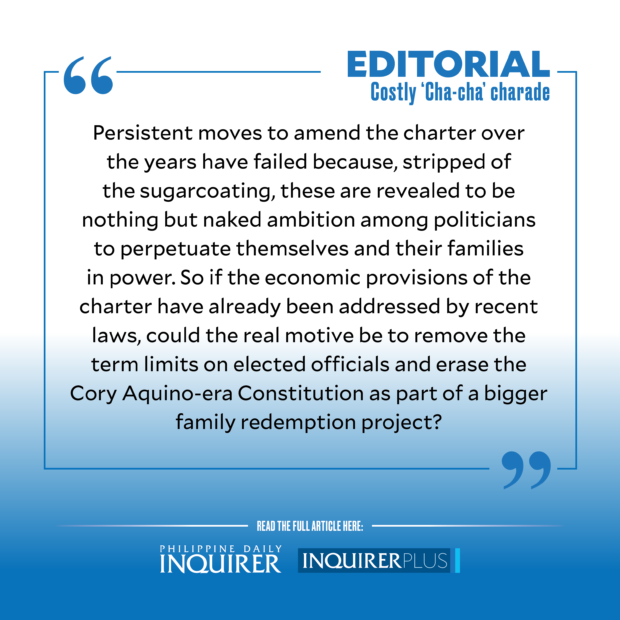
The House panel took Charter change (Cha-cha) proposals on the road despite a very clear pronouncement by President Marcos Jr. that amending the Constitution was “not a priority … because there are so many other things that we need to do first.” The President issued the statement in Japan at the end of his five-day state visit which, according to the Palace, generated 35 investment pledges from Japanese investors worth $13 billion.
While Mr. Marcos has acknowledged that economic provisions in the Constitution, such as the ban on foreign ownership of land or corporations, can get in the way of attracting foreign investments, “these things we are talking about can be achieved without replacing the Constitution,” he said. “We can get what we want, but within the present … the way the Constitution is written,” he added. The President can’t be any more categorical than that, and one would expect his allies in Congress to get the message loud and clear.
But Cagayan de Oro Rep. Rufus Rodriguez, chair of the House panel on constitutional amendments, said the House “will proceed with its public dialogues on [the] issue.” Sen. Robinhood Padilla even suggested that the counterpart panel that he chairs should “just resign because we are no longer useful there in the Senate.” The former action star added that he got the highest number of votes for senator in the last elections because of his Cha-cha advocacy. Senate President Juan Miguel Zubiri meanwhile said that, while Charter change was “never really on our agenda” in the Senate, he would not stop Padilla’s committee from conducting hearings on it. He stated his misgivings about it though: “I welcome the statement of the President because, at this point in time, we do not want to put in anything that is divisive—and I think (Cha-cha) is a divisive issue,” Zubiri said.
So what is the point of the expensive consultations and hearings? Would the public pulse still be considered now that the House seems determined to undertake Charter change? Apparently not, as the House panel approved yesterday a proposed joint resolution calling for a constitutional convention to amend the Charter. A con-con, composed of delegates elected for that purpose, is supposed to be a better alternative to a constituent assembly, composed of the incumbent lawmakers. Still, this could just be an illusion, as the same political dynasties have the resources to field candidates for a con-con. Cha-cha via con-con or “con-ass” would also entail billions of pesos at a time of economic hardship.
While the House asserts that it will only be the “restrictive economic provisions” they are after, constitutional experts have said that any Cha-cha undertaking can open up the entire Constitution to revision, or to being junked altogether. And why tamper with the fundamental law of the land when several major laws have already been passed to address limitations on foreign investments, such as the Retail Trade Liberalization Act, the Foreign Investment Act, and notably, the Public Service Act of 2022, which categorized telecommunications, railways, expressways, airports, and shipping industries as public services which can be 100-percent foreign-owned? Besides, entrenched corruption has been proven to deter investments, not the Constitution.
Some proponents have pointed to a lack of clarity in the language of the Constitution. Blame that on the failure of the legislature to propose and pass the proper implementing laws, the most glaring of which is the ban on political dynasties. More than three decades later, the dynastic Congress has not enacted any law defining and restricting political dynasties for obvious reasons.
Persistent moves to amend the Charter over the years have failed because, stripped of the sugarcoating, these are revealed to be nothing but naked ambition among politicians to perpetuate themselves and their families in power.
So if the economic provisions of the Charter have already been addressed by recent laws, could the real motive be to remove the term limits on elected officials and erase the Cory Aquino-era Constitution as part of a bigger family redemption project?
If there were no secret understanding between the House and Malacañang to ram Cha-cha down our throats this year or within the Marcos Jr. term, then the administration-dominated House has no reason to defy the President’s priority measures meant to revive the economy from the ravages of the pandemic. And if the President were sincere in not dancing to the “cha-cha” moves in Congress, can the House public consultations be nothing but a showy, costly charade?